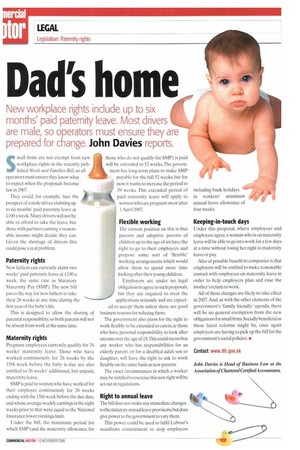New workplace rights include up to six months' paid paternity
Page 42

If you've noticed an error in this article please click here to report it so we can fix it.
leave. Most drivers are male, so operators must ensure they are
prepared for change. John Davies repor-s.
Small firms are not exempt from new workplace rights in the recently published Work and Families Bill, so all operators must ensure they know what to expect when the proposals become law in 2007.
They could, for example, face the prospect of a male driver claiming up to six months' paid paternity leave at £100 a week. Many drivers will not be able to afford to take the leave, but those with partners earning a reasonable income might decide they can. Given the shortage of drivers this could pose a real problem.
Paternity rights
New fathers can currently claim two weeks' paid paternity leave at £100 a week, the same rate as Statutory Maternity Pay (SMP). The new bill paves the way for new fathers to take their 26 weeks at any time during the first year of the baby's life.
This is designed to allow the sharing of parental responsibility, so both parents will not be absent from work at the same time.
Maternity rights
Pregnant employees currently qualify for 26 weeks' maternity leave. Those who have worked continuously for 26 weeks by the 15th week before the baby is due are also entitled to 26 weeks' additional, but unpaid, maternity leave.
• SMP is paid to women who have worked for their employer continuously for 26 weeks ending with the 15th week before the due date, and whose average weekly earnings in the eight weeks prior to that were equal to the National Insurance lower earnings limit.
Under the bill, the maximum period for which SMP (and the maternity allowance, for those who du not qualify for SMP) is paid will be extended to 52 weeks. The government has long-term plans to make SMP payable for the full 52 weeks, but for now it wants to increase the period to 39 weeks. This extended period of paid maternity leave will apply to women who are pregnant on or after 4 1 April 2007.
Flexible working
The current position on this is that parents and adoptive parents of children up to the age of six have the right to go to their employers and propose some sort of 'flexible' working arrangements which would allow them to spend more time looking after their young children.
Employers are under no legal ‘: obligation to agree to such proposals, but they are required to treat the applications seriously and are expect ed to accept them unless there are good business reasons for refusing them.
The government also plans for the right to work flexibly to be extended to carers, ie those who have personal responsibility to look after anyone over the age of 18.This could mean that any worker who has responsibilities for an elderly parent, or for a disabled adult son or daughter, will have the right to ask to work flexibly on the same basis as new parents.
The exact circumstances in which a worker may be entitled to exercise this new right will be set out in regulations.
Right to annual leave
The bill does not make any immediate changes to the statutory annual leave provisions, but does give power to the government to vary them.
This power could be used to fulfil Labour's manifesto commitment to stop employers including bank holidays in workers' minimum annual leave allowance of four weeks.
Keeping-in-touch days
Under this proposal, where employees and employers agree, a woman who is on maternity leave will be able to go into work for a few days at a time without losing her right to maternity leave or pay.
Also of possible benefit to companies is that employers will be entitled to make reasonable contact with employees on maternity leave in order to help employers plan and ease the mother's return to work.
All of these changes are likely to take effect in 2007. And, as with the other elements of the government's 'family friendly' agenda, there will be no general exemption from the new obligations for small firms. Socially beneficial as these latest reforms might be, once again employers are having to pick up the bill for the government's social policies.
Contact: www.ilti.gav.uk John Davies is Head of Business Law at the Association of Chartered Certified Accountants.






































































































































































































